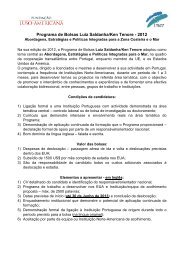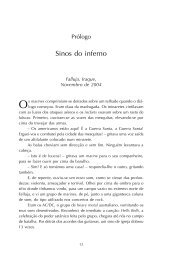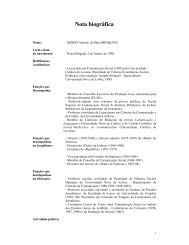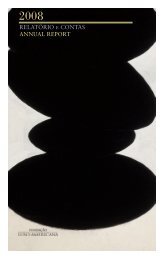A decade later - Fundação Luso-Americana
A decade later - Fundação Luso-Americana
A decade later - Fundação Luso-Americana
You also want an ePaper? Increase the reach of your titles
YUMPU automatically turns print PDFs into web optimized ePapers that Google loves.
After our interviews in the penitentiary,<br />
Sandra Enos remarked that when you are a<br />
woman who’s committed a crime, you’re<br />
penalized twice. In addition to the legal punishment,<br />
these women often lose custody of<br />
their children. “In most US correctional<br />
facilities mothers and their children are not<br />
allowed to be together,” she says. “Some<br />
women are incapable of putting motherhood<br />
first, but I’ve met good mothers and stable<br />
families among the inmates.”<br />
According to the Prison Activist Resource<br />
Center, on any given day there are 90 thousand<br />
women in detention in the US and, as<br />
a result, 167 thousand children are forced<br />
to grow up without their mothers.<br />
When Sophie, 24, who is sitting next to<br />
Petra, launches into her story, you realize<br />
that she’s lived as fast as she talks. From<br />
her rapid-fire sentences we find out that<br />
her 11 month-old son was born hooked<br />
on the same addictive white powder that<br />
drove his mother to prostitution. Convicted<br />
for selling drugs, Sophie comes from a long<br />
line of marginalized family members who<br />
are no strangers to the correctional system.<br />
62<br />
socieTy<br />
‘ “in most us correctional facilities mothers and their<br />
children are not allowed to be together,” she says.<br />
“some women are incapable of putting motherhood first,<br />
but i’ve met good mothers and stable families among<br />
the inmates.”<br />
’<br />
A victim of child abuse, Sophie was turning<br />
20-dollar tricks before she was picked<br />
up by police. She freely admits that she<br />
needed the help she found in jail. “Being<br />
here saved my life,” she admits. “If it wasn’t<br />
for the doctor’s appointments they made<br />
me go to after I was arrested, my son<br />
would have been born blind.”<br />
Trisha has been sentenced to 18 months.<br />
Less insecure than Sophie, she is a perfect<br />
illustration of the role poverty and crossgenerational<br />
delinquency play in the lives<br />
of these inmates. At 13 she was already an<br />
addict with a mother hooked on heroine<br />
and an alcoholic father. Two fleeting experiences<br />
with motherhood are the closest she<br />
came to having a family relationship.<br />
An inmate and her child in the corridor of the women’s prison in Tires, portugal.<br />
She is tough when she talks and her<br />
words smack of intentional self-flagellation,<br />
as if she thought she deserved all her suffering<br />
and didn’t need anyone to tell her<br />
she’d screwed up. “I’m a 22 year-old junky<br />
and a convict,” she says. “I’m not fit to be<br />
a mother. I’m really sorry about it, but that<br />
doesn’t change anything. Before, if I was<br />
given a choice between coke and my baby,<br />
I would have handed him over in a heartbeat<br />
for a few lines.”<br />
According to the US Department of Justice,<br />
close to two million minors have a parent<br />
in prison. The miles that separate female<br />
inmates from their progeny is one of the<br />
most painful consequences of incarceration,<br />
and one that is attributable to gender. Today,<br />
Parallel no. 6 | FALL | WINTER 2011<br />
JOSé CARLOS CARVALhO
















